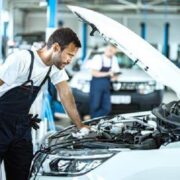Every year, HGV drivers are involved in thousands of accidents around the world and although other vehicles were to blame in the vast majority of incidents, there were times when the condition of an HGV was found to be the cause. Maintenance should be a top priority, but why is it so important and what are your legal obligations as an HGV driver?
Table of Contents
Vehicle Maintenance 101
Any good HGV training course will explain the vital importance of maintaining your heavy goods vehicle and not just for your safety – but for the safety of other road users as well. You are technically in charge of a 3-4000kg tank, capable of reaching high speeds that can be challenging to reduce when on motorways and other straight roads.
Ensuring that your HGV is properly prepared for the journey ahead can actually save lives, and this is why frequent maintenance is a top priority. A licensed mechanic should take care of the technicalities, but there are still things that you can do to maximise your safety (and that of others). These include checking your tire pressure, as well as adjusting your mirror, or even fitting additional ones to maximise your visibility.
Internally, you can keep a clean space on the dashboard to avoid any distractions while driving and many HGV drivers like to open the bonnet and check their engine and radiator fluid before each journey to avoid the risk of overheating. You could also make yourself a checklist of things to evaluate before a road trip – and it’s advisable to stop in at a mechanic’s workshop at least once every few weeks to ensure that all is functioning as it should.
Failing to Maintain Your Vehicle
As mentioned briefly above, there are legal requirements associated with driving an HGV and if you fail to follow them, you could be fined or worse. This information will be provided during your training course, but you can also find extra data online, in printed workbooks and in other materials to help you to make sure that you are keeping up with the latest code.


















Comments